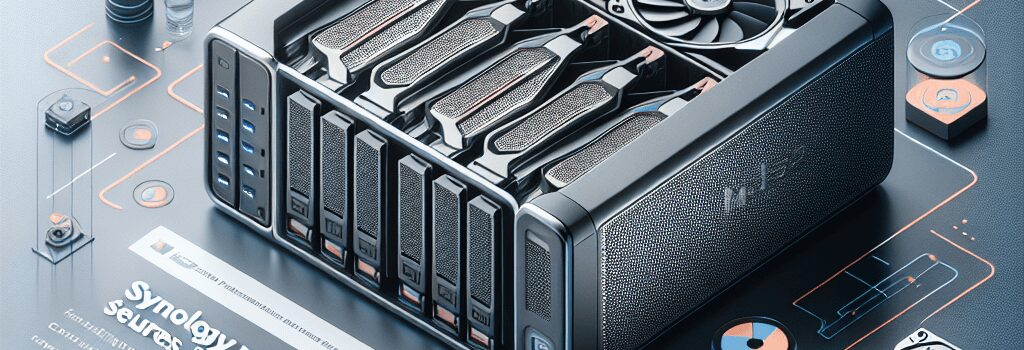Synology Mandates Branded Drives for New Plus Series NAS Models: Balancing Performance, Security, and Flexibility

Leading NAS manufacturer Synology has confirmed that its higher-end NAS devices—the new Plus series starting with the 2025 models—will require the use of Synology-branded hard drives for full compatibility. This decision follows the company’s announcement on its German website and is backed by extensive internal testing. Synology will also be rolling out a “curated drive compatibility” list as additional drives are thoroughly vetted, ensuring optimized performance and long-term reliability for enterprise-grade storage environments.
Enhanced System Performance through Branded Drive Integration
The requirement for Synology-branded drives stems from a rigorous validation process. Synology engineers have identified that these drives, designed with tight hardware-software integration, experience fewer drive failures, improved error correction, and stable performance when managing complex storage pools. Key NAS features such as volume-wide deduplication and lifespan analysis are tightly coupled with the drive firmware, which is specifically tuned to work with Synology systems. This advantage allows for tighter control over system integrity and data security — critical parameters in enterprise storage and cloud environments.
Technical Specifications and Validation Process
According to a company representative, only a selected range of hard drives have been optimized for performance in the Synology Plus line. For example, the new 8TB HAT3310 drive, part of the Plus series, is engineered with advanced firmware that enhances error correction and is validated through extended environmental stress tests, vibration stability tests, and thermal management protocols. While third-party drives are widely available, the certification process ensures that only those components which meet Synology’s demanding operational standards are offered in the high-end models. Notably, existing Synology Plus units purchased prior to the 2025 series, along with the J and Values series products, will continue to support third-party drives without modification, and users can migrate these drives into newer models without facing compatibility issues.
Economic and Market Considerations
From an economic standpoint, Synology’s move ensures that the combined hardware-software package delivers optimal results for mission-critical applications. However, this curated approach comes with a premium pricing strategy. For instance, while an 8TB branded drive such as the HAT3310 retails at approximately $210 on Synology’s web store, comparable third-party models like the Toshiba N300 series are available at around $173. In high-density storage arrays, these cost differences can accumulate significantly, sparking debate among industry professionals regarding the trade-offs between system integrity and cost-effectiveness.
Industry Expert Opinions and Broader Market Impact
Industry analysts see Synology’s new policy as a strategic effort to mitigate risks associated with hardware failures while reinforcing the security configuration of NAS systems. Experts point out that the integration of dedicated, validated hardware is essential in environments that handle large data volumes and require uncompromised uptime. Although this may present higher initial costs, the long-term benefits in terms of reduced maintenance and improved system reliability are expected to outweigh the added expenses in professional setups.
Deeper Analysis: Strengthening Data Security in the Storage Ecosystem
In today’s threat landscape, maintaining robust data security is a top priority for both enterprise and home users. Synology’s insistence on using branded drives contributes to a controlled storage environment where every hardware element is cleared through stringent security checks. This approach not only minimizes vulnerability to firmware-level attacks but also ensures that system updates and security patches are harmoniously synchronized with the hardware, significantly reducing the risk of exploitation through third-party components.
Deeper Analysis: Balancing Customization with Reliability
While Synology’s move to require branded drives underscores its commitment to stability and performance, it also raises questions about user flexibility and customization. Many advanced users and small business owners have traditionally relied on the freedom to select third-party drives that suit their specific needs. Synology’s planned introduction of a “carefully curated drive compatibility framework” offers a compromise—allowing users to submit drives for testing, which may eventually expand the list of approved third-party options. This balance between curated compatibility and user choice appears to be a deliberate strategy to support both reliability and innovation within the NAS ecosystem.
Conclusion
Synology’s decision to enforce the use of Synology-branded drives for its new Plus series models is a clear reflection of its commitment to delivering a secure, efficient, and reliable storage solution. Although this decision may increase the upfront cost for end users, the long-term benefits of enhanced performance and stability in high-demand environments are substantial. As the ecosystem continues to evolve, the industry will be watching closely to see how these measures influence both market dynamics and broad user adoption.